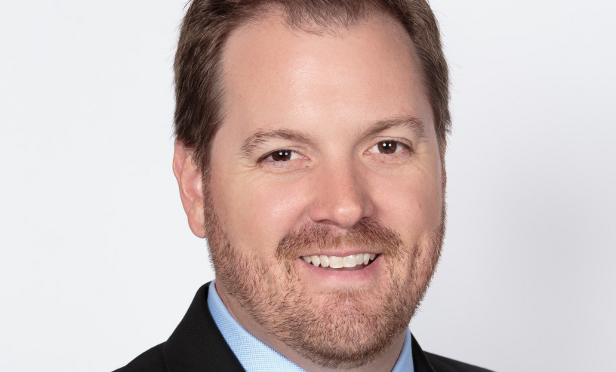
NEWPORT BEACH, CA—Most people may not know that roughly 70% of commercial real estate is valued at $40 million or less, Buchanan Street Partners' Matt Doerr tells GlobeSt.com. Doerr was recently appointed VP of the firm to lead the company's growing bridge-loan platform under Buchanan Mortgage Holdings, the company's proprietary lending business. His appointment comes at a time of increased lending activity, following the recent closing of three loans totaling $30 million. We chatted exclusively with Doerr about the firm's bridge-loan program, which accommodates the middle market of commercial real estate financing.
GlobeSt.com: What do you hope to accomplish in your new role with Buchanan Street Partners?
Doerr: First off, I was very excited about joining Buchanan Street because they have a great reputation and history as an active capital-markets participant in both the debt and equity space. What was appealing to me was their creativity and full capital-stack conversancy, and the opportunity to help lead and build the debt platform. My goal is to further Buchanan Street's lending brand and presence within the western states and position our platform as a leading bridge/construction lender among sponsors and intermediaries. In this regard, we consider “sponsors” to be borrowers that are bringing forth a portion of equity and seek a larger portion of debt. Likewise, “intermediaries” is our term that represents the brokers that are in search of capital sources on behalf of borrowers. Moving forward, I hope to educate intermediaries and help them further their capital-solution options to their clients.
GlobeSt.com: Tell us about the firm's bridge-loan platform and why it's expanding.
Doerr: Interestingly, most people may not know that roughly 70% of commercial real estate is valued at $40 million or less, within what is considered the “middle market.” We have built our bridge lending practice to accommodate this significant borrower base and believe that private lending with an institutional-quality experience will be in great demand.
That's the backdrop, but more specifically to the current lending environment, Buchanan Street continues to see dislocation in the middle-market CRE lending space that is driven by an evolving regulatory environment and is impacting not only regulated banks, but also CMBS issuers and investors. As Dodd-Frank and Basel III implications continue to play out, more and more CRE owners/developers will seek flexible-debt platforms to provide reliable, custom-tailored capital solutions. Specifically, our product caters to a $5 million-to-$25 million loan request that can accommodate quick-close, bridge, acquisition and construction needs.
GlobeSt.com: What investment trends do you see emerging?
Doerr: We're still seeing experienced sponsors find interesting and accretive real estate investments, so opportunities do exist. However, finding reliable and predictable acquisition or bridge capital has been a challenge, given some of the reasons I mentioned. Well-capitalized and responsive lenders can add value by offering thoughtfully structured quick-close capital or by providing non-recourse construction financing to experienced developers. Lately we've seen the small- to middle-market construction financing market really tighten, which has pushed more requests to private lenders. For example, industrial real estate in the Inland Empire is in high demand right now. If a developer wanted to build industrial and could commit 25% of the construction costs, a few years ago a bank could have provided that financing. Now, because of HVCRE regulations and other drivers, a developer in this situation is likely to source non-recourse capital in the private lending space.
GlobeSt.com: What else should our readers know about proprietary lending?
Doerr: We are a significant real estate owner and operator ourselves, typically on larger asset sizes, and therefore we are an active user of debt. So, we have built a lending platform that's responsive to the broader CRE capital market environment, yet engineered to be flexible and provide sponsors and intermediaries with the certainty of execution that you need from a bridge lender. In today's market, it's important to understand a lender's level of discretion over their capital and their approval process. Sponsors and intermediaries should be aware that opportunities to secure bridge capital still abound, and they should align themselves with a proven lender.
For in-depth discussions of the middle market and alternative sources of financing, be sure to attend RealShare National Investment & Finance, scheduled for Oct. 5 and 6 at the Roosevelt Hotel in New York City.

NEWPORT BEACH, CA—Most people may not know that roughly 70% of commercial real estate is valued at $40 million or less, Buchanan Street Partners' Matt Doerr tells GlobeSt.com. Doerr was recently appointed VP of the firm to lead the company's growing bridge-loan platform under Buchanan Mortgage Holdings, the company's proprietary lending business. His appointment comes at a time of increased lending activity, following the recent closing of three loans totaling $30 million. We chatted exclusively with Doerr about the firm's bridge-loan program, which accommodates the middle market of commercial real estate financing.
GlobeSt.com: What do you hope to accomplish in your new role with Buchanan Street Partners?
Doerr: First off, I was very excited about joining Buchanan Street because they have a great reputation and history as an active capital-markets participant in both the debt and equity space. What was appealing to me was their creativity and full capital-stack conversancy, and the opportunity to help lead and build the debt platform. My goal is to further Buchanan Street's lending brand and presence within the western states and position our platform as a leading bridge/construction lender among sponsors and intermediaries. In this regard, we consider “sponsors” to be borrowers that are bringing forth a portion of equity and seek a larger portion of debt. Likewise, “intermediaries” is our term that represents the brokers that are in search of capital sources on behalf of borrowers. Moving forward, I hope to educate intermediaries and help them further their capital-solution options to their clients.
GlobeSt.com: Tell us about the firm's bridge-loan platform and why it's expanding.
Doerr: Interestingly, most people may not know that roughly 70% of commercial real estate is valued at $40 million or less, within what is considered the “middle market.” We have built our bridge lending practice to accommodate this significant borrower base and believe that private lending with an institutional-quality experience will be in great demand.
That's the backdrop, but more specifically to the current lending environment, Buchanan Street continues to see dislocation in the middle-market CRE lending space that is driven by an evolving regulatory environment and is impacting not only regulated banks, but also CMBS issuers and investors. As Dodd-Frank and Basel III implications continue to play out, more and more CRE owners/developers will seek flexible-debt platforms to provide reliable, custom-tailored capital solutions. Specifically, our product caters to a $5 million-to-$25 million loan request that can accommodate quick-close, bridge, acquisition and construction needs.
GlobeSt.com: What investment trends do you see emerging?
Doerr: We're still seeing experienced sponsors find interesting and accretive real estate investments, so opportunities do exist. However, finding reliable and predictable acquisition or bridge capital has been a challenge, given some of the reasons I mentioned. Well-capitalized and responsive lenders can add value by offering thoughtfully structured quick-close capital or by providing non-recourse construction financing to experienced developers. Lately we've seen the small- to middle-market construction financing market really tighten, which has pushed more requests to private lenders. For example, industrial real estate in the Inland Empire is in high demand right now. If a developer wanted to build industrial and could commit 25% of the construction costs, a few years ago a bank could have provided that financing. Now, because of HVCRE regulations and other drivers, a developer in this situation is likely to source non-recourse capital in the private lending space.
GlobeSt.com: What else should our readers know about proprietary lending?
Doerr: We are a significant real estate owner and operator ourselves, typically on larger asset sizes, and therefore we are an active user of debt. So, we have built a lending platform that's responsive to the broader CRE capital market environment, yet engineered to be flexible and provide sponsors and intermediaries with the certainty of execution that you need from a bridge lender. In today's market, it's important to understand a lender's level of discretion over their capital and their approval process. Sponsors and intermediaries should be aware that opportunities to secure bridge capital still abound, and they should align themselves with a proven lender.
For in-depth discussions of the middle market and alternative sources of financing, be sure to attend RealShare National Investment & Finance, scheduled for Oct. 5 and 6 at the Roosevelt Hotel in
Want to continue reading?
Become a Free ALM Digital Reader.
Once you are an ALM Digital Member, you’ll receive:
- Breaking commercial real estate news and analysis, on-site and via our newsletters and custom alerts
- Educational webcasts, white papers, and ebooks from industry thought leaders
- Critical coverage of the property casualty insurance and financial advisory markets on our other ALM sites, PropertyCasualty360 and ThinkAdvisor
Already have an account? Sign In Now
*May exclude premium content© 2025 ALM Global, LLC, All Rights Reserved. Request academic re-use from www.copyright.com. All other uses, submit a request to [email protected]. For more information visit Asset & Logo Licensing.








